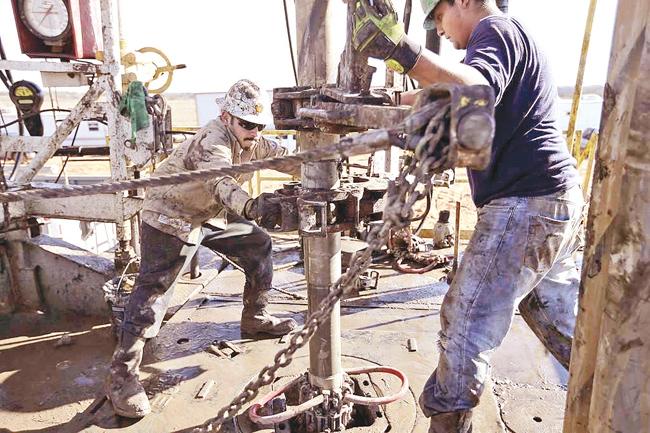
The world’s major oil producers have extended production cuts through to the end of 2018, in a bid to tackle a global glut of crude and keep prices buoyant.
Members of Opec, the oil cartel, and other major producers including Russia agreed that the curbs, which started in January and have lifted a barrel of Brent crude from $40 to $50 last year to more than $60 now, will continue for a further nine-months.
Khalid al-Falih, the Saudi energy minister, said the extension of the current cuts – which expire at the end of March 2018 – was necessary because “more work needed to be done”.
Following the deal at a meeting in Vienna which ministers hailed as historic and unprecedented, the price of Brent stood at $63.28 a barrel, up 0.27% on the day.
Alexander Novak, the Russian energy minister, said: “To reach our goals, to rebalance the market, we must continue to act in a coordinated fashion, to act jointly, which would take us further in 2018 [with cuts].”
Despite suggestions ahead of the meeting that the Saudis and Russians were at odds over the extension, Falih said of his Russian counterpart: “You cannot find light between us. We have been united shoulder to shoulder ... We are completely aligned.”
As the biggest producer in Opec and the country bearing the brunt of the cuts of 1.8m barrels a day, Saudi Arabia is the key player at the talks. The kingdom needs a strong oil price to support the planned $2tn listing of its national oil company in the second half of 2018, which would be the world’s biggest stock market flotation.
Russia, by contrast, was seen as wary of ceding too much market share to rivals and helping US crude producers with a higher oil price.
In what is seen as a sop to Moscow, the extension will be reviewed in June to assess whether the glut of oil on world markets is on track to come back down to a five-year average.
Falih said a decision in May by Opec and its allies to extend the curbs to March 2018 had already driven global oil supply and demand much closer into balance.
“Market stability has improved and the sentiment is generally upbeat. The rebalancing trend has accelerated and inventories are on a generally declining trend,” he said.
Falih said the action taken by the cartel, which along with geopolitical uncertainty has pushed the oil prices to two-year highs, had demonstrated the club’s power.
“Opec’s credibility has also been enhanced, although a couple of members have lagged behind and we hope they will pick up their conformity [to the targets] in months to come,” Falih said, in an apparent reference to Iraq and the UAE. Falih said the cartel was aware of the risk of a resurgent US shale oil industry, and the group would be “agile” in responding. However, he downplayed shale’s impact, saying US oil production this year had been moderate. “There was a lot of fear mongering about shale in 2017,” he said.
The number of US oil rigs has leapt by more than a third since a year ago, when Opec and Russia first agreed to curtail production.
Oil analysts Wood Mackenzie said stakes had been high for Opec and Russia, but Thursday’s decision meant global oil supply and demand would come closer into balance in the second half of 2018, and prices would go higher at the same time.
Olivier Jakob, analyst at Petromatrix, said that while the outcome was largely as expected, the meeting showed that countries were beginning to look at an exit strategy.
“I think the June review is really part of the exit strategy that the Russians desire,” he said.
- Theguardian.com
